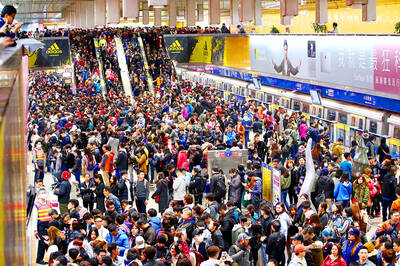CNNGo has told the government that an article linking Taipei with “gluttony” was not meant to be derogatory, Government Information Office (GIO) Minister Philip Yang (楊永明) said yesterday.
CNNGo, CNN’s culture and travel Web site, published an article on April 20 that used Christianity’s seven deadly sins to describe the best Asian city to commit each sin, with Taipei named as the place to go to “be” gluttonous, Seoul for people who wanted to be slothful and Pyongyang for those wanting to be wrathful.
GIO officials in Hong Kong recently met with Andrew Demaria, CNNGo’s editor-in-chief to discuss the story, the GIO said yesterday.
The officials were told that the article did not mean to criticize people in Taiwan for being gluttonous, but to praise Taiwan’s gourmet cuisine.
Demaria said the article aimed to say that gourmet cuisine was available in Taipei day or night and that people would eat whatever they wanted, the GIO said in a statement said.
CNNGo regretted the article was read in a negative way and that readers should have understood it correctly if they read had it carefully, the statement said.
“After the visit, CNNGo posted a new article on its Web site on May 20 that introduced bubble milk tea and commended Taiwan for its tea culture,” Yang said.
CNNGo will send journalists to Taiwan to report on its cuisine and culture, Yang said.

People can take the Taipei MRT free of charge if they access it at Nanjing Sanmin Station or Taipei Arena Station on the Green Line between 12am and 6am on Jan. 1, the Taipei Department of Transportation said on Friday, outlining its plans to ease crowding during New Year’s events in the capital. More than 200,000 people are expected to attend New Year’s Eve events in Taipei, with singer A-mei (張惠妹) performing at the Taipei Dome and the city government’s New Year’s Eve party at Taipei City Hall Plaza, the department said. As people have tended to use the MRT’s Blue or

Civil society groups yesterday protested outside the Legislative Yuan, decrying Chinese Nationalist Party (KMT) efforts to pass three major bills that they said would seriously harm Taiwan’s democracy, and called to oust KMT caucus whip Fu Kun-chi (傅?萁). It was the second night of the three-day “Bluebird wintertime action” protests in Taipei, with organizers announcing that 8,000 people attended. Organized by Taiwan Citizen Front, the Economic Democracy Union (EDU) and a coalition of civil groups, about 6,000 people began a demonstration in front of KMT party headquarters in Taipei on Wednesday, organizers said. For the third day, the organizers asked people to assemble

Taipei is participating in Osaka’s Festival of Lights this year, with a 3m-tall bubble tea light installation symbolizing Taiwan’s bubble tea culture. The installation is designed as a bubble tea cup and features illustrations of Taipei’s iconic landmarks, such as Taipei 101, the Red House and North Gate, as well as soup dumplings and the matchmaking deity the Old Man Under the Moon (月下老人), affectionately known as Yue Lao (月老). Taipei and Osaka have collaborated closely on tourism and culture since Taipei first participated in the festival in 2018, the Taipei City Department of Information and Tourism said. In February, Osaka represented

Taiwanese professional baseball should update sports stadiums and boost engagement to enhance fans’ experience, Chinese Professional Baseball League (CPBL) commissioner Tsai Chi-chang (蔡其昌) told the Liberty Times (sister paper of the Taipei Times) in an interview on Friday. The league has urged Farglory Group and the Taipei City Government to improve the Taipei Dome’s outdated equipment, including relatively rudimentary television and sound systems, and poor technology, he said. The Tokyo Dome has markedly better television and sound systems, despite being 30 years old, because its managers continually upgraded its equipment, Tsai said. In contrast, the Taipei Dome lacked even a room for referees